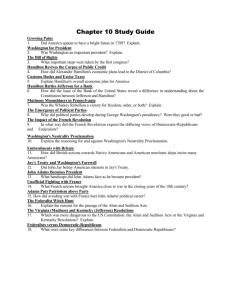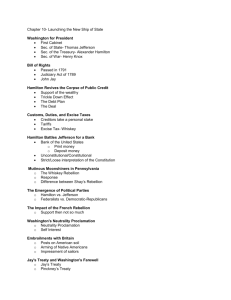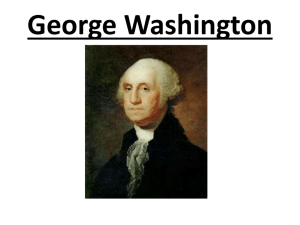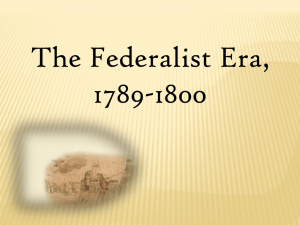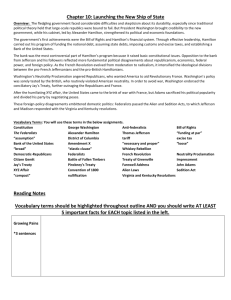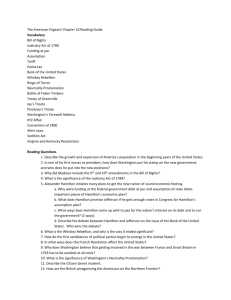10 - IB-History-of-the
advertisement
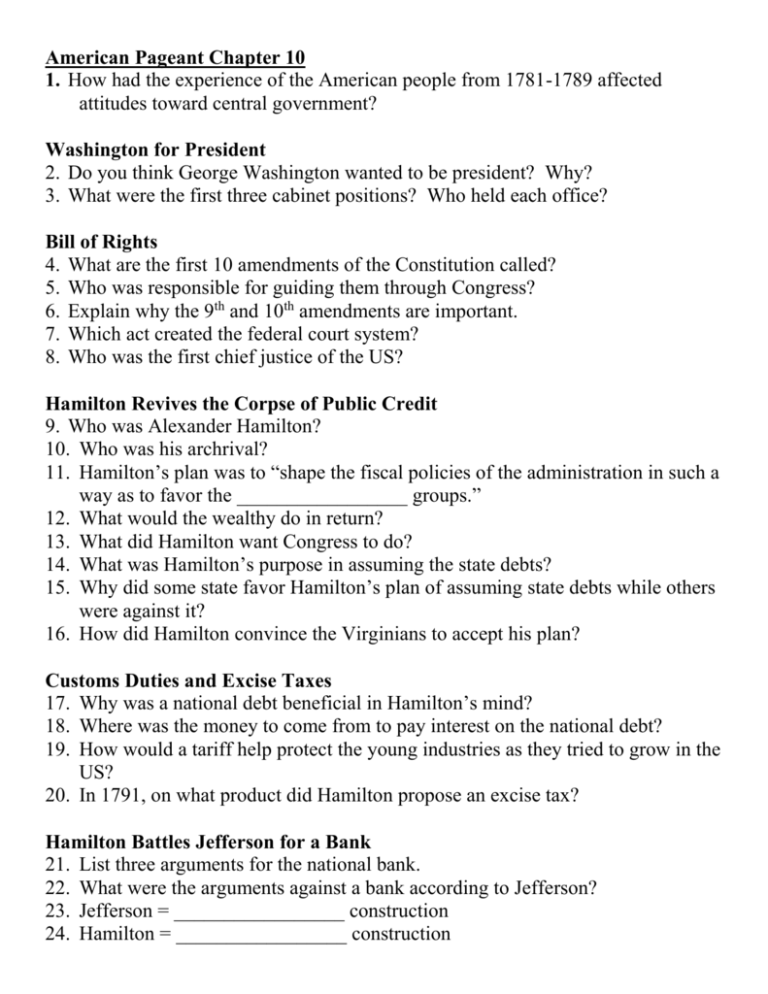
American Pageant Chapter 10 1. How had the experience of the American people from 1781-1789 affected attitudes toward central government? Washington for President 2. Do you think George Washington wanted to be president? Why? 3. What were the first three cabinet positions? Who held each office? Bill of Rights 4. What are the first 10 amendments of the Constitution called? 5. Who was responsible for guiding them through Congress? 6. Explain why the 9th and 10th amendments are important. 7. Which act created the federal court system? 8. Who was the first chief justice of the US? Hamilton Revives the Corpse of Public Credit 9. Who was Alexander Hamilton? 10. Who was his archrival? 11. Hamilton’s plan was to “shape the fiscal policies of the administration in such a way as to favor the _________________ groups.” 12. What would the wealthy do in return? 13. What did Hamilton want Congress to do? 14. What was Hamilton’s purpose in assuming the state debts? 15. Why did some state favor Hamilton’s plan of assuming state debts while others were against it? 16. How did Hamilton convince the Virginians to accept his plan? Customs Duties and Excise Taxes 17. Why was a national debt beneficial in Hamilton’s mind? 18. Where was the money to come from to pay interest on the national debt? 19. How would a tariff help protect the young industries as they tried to grow in the US? 20. In 1791, on what product did Hamilton propose an excise tax? Hamilton Battles Jefferson for a Bank 21. List three arguments for the national bank. 22. What were the arguments against a bank according to Jefferson? 23. Jefferson = _________________ construction 24. Hamilton = _________________ construction 25. 26. 27. 28. Which clause did Hamilton use to argue against Jefferson? Necessary and proper clause = __________________ clause Who won? From which region did most of the “enthusiastic support for the bank” naturally come? 29. From which region did most of the opposition come? Mutinous Moonshiners in Pennsylvania 30. Why did the trans-Appalachian whiskey-makers rebel? 31. What did Washington prove when he sent in the militia? The Emergence of Political Parties 32. What is the difference between a faction and a political party? 33. What is the positive role that political parties play in government? 34. What were the first two political parties? (Read chart on p. 197) Who were the leaders of the first political parties? (First paragraph on page 198) Impact of the French Revolution 35. Explain how Americans reacted to each stage in the French Revolution. -Early stages -Reign of Terror -War with Britain Washington’s Neutrality Proclamation 36. What was the Franco-American Alliance of 1778? 37. How did the attitudes begin to differ by party, especially regarding the Alliance? 38. What official policy was taken by the US toward the conflict? 39. Explain Washington’s reasoning on neutrality. 40. What were the two parts of the Neutrality Proclamation of 1793? 41. How did Edmund Genet violate the policy of neutrality? Embroilments with Britain 42. How and where were the British continuing to challenge American sovereignty? 43. What did the Miami insist was the north-western boundary of the United States? 44. Describe the Battle of Fallen Timbers. 45. Describe the Treaty of Greenville? 46. Meanwhile, what was the Royal Navy doing to American ships and seamen in the West Indies? 47. Why were the Federalists less than willing to challenge the British actions? Jay’s Treaty and Washington’s Farewell 48. Why did Washington send John Jay to London? 49. What effect did Hamilton’s sabotage have on the accomplishments? 50. List 2 things the US gained from Jay’s Treaty. 51. List 2 things the US lost from Jay’s Treaty. 52. What was the reaction at home? 53. Explain why different regions reacted differently to Jay’s Treaty. 54. What did the US gain from Spain in Pinckney’s Treaty of 1795? 55. What precedent (tradition) was set by Washington when he left office? 56. How long would the unofficial precedent last? 57. Which amendment made the precedent official? 58. What piece of advice did he give his countrymen in his Farewell Address? 59. List 4 things that Washington left as his legacy. John Adams Becomes President 60. Why did the Federalists turn to Adams as Washington’s successor and not Hamilton? 61. Who did the Dem-Reps nominate? 62. What happened to the level of partisan bickering once Washington left the scene? 63. What were the main issues of the Election of 1796? 64. What prevented a repeat of the unexpected problem of Pres and VP from different parties? (* on p.202) 65. Summarize the problems that Adams faced. Unofficial Fighting with France 66. How did the French react to Jay’s Treaty? 67. What did the French demand of our diplomats? 68. Which party was embarrassed by the XYZ Affair? Adams Puts Patriotism Above Party 69. What were Napoleon’s goals in the New World? 70. What did the Convention of 1800 end? 71. Describe John Adam’s Legacy. The Federalist Witch Hunt 72. What political party did most immigrants support? 73. How did the new laws make it more difficult for “aliens” to become citizens? 74. Under the Alien Laws, the “president was empowered to deport dangerous foreigners in a time of peace and to ________________ or ______________________ them in time of hostilities. 75. Describe the Sedition Act. 76. Were the actions described in the Sedition Act truly seditious (rebellious/treason) or was the act itself unconstitutional? 77. Why was the law to expire in 1801? The Virginia (Madison) and Kentucky (Jefferson) Resolutions 78. According to the compact theory, what can a state do to a federal law it deems unconstitutional? 79. Where does the right to declare or judge a law unconstitutional reside? Federalists versus Democratic-Republicans 80. Why has Jefferson been called “a traitor to his class?” 81. What did Jefferson believe should be the foundation of the nation’s economy? 82. What did Jefferson believe had to precede universal suffrage? 83. How did Jefferson justify slavery in the name of ordinary white men? 84. What was the key cog in Hamilton’s economic plan for the nation? 85. As the 1790s came to a close, why did the founders feel the nation was “at risk?”
